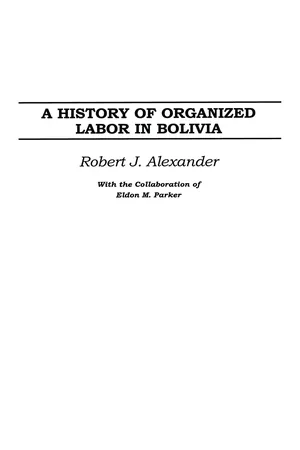
- 212 pages
- English
- PDF
- Available on iOS & Android
A History of Organized Labor in Bolivia
About this book
Bolivia was the center stage for one of the most important Latin American social revolutions of the twentieth century, one that occurred amid a sea of tremendous political instability. The expansion of organized labor that occurred during the 1920s was met with multiple government reprisals and was largely curbed by the Chaco War with Paraguay of 1932-1935. Nevertheless, despite being compelled to operate illegally, the labor movement found support in several political parties, the most successful of which was the Movimiento Nacionalista Revolucionario, a powerhouse in the miners' federation. Conscious of the remarkable upheavals which punctuated Bolivian history during the twentieth century, Alexander traces the relative successes of Bolivia's labor unions, contextualizing their triumphs and disappointments within the captivating history of Bolivia's tumultuous political scene. Bolivia was the center stage for one of the most important Latin American social revolutions of the twentieth century, one that occurred amid a sea of tremendous political instability. The expansion of organized labor that occurred during the 1920s was met with numerous government reprisals and was largely curbed by the Chaco War with Paraguay of 1932-1935. Nevertheless, despite being compelled to operate illegally, the labor movement found support in several political parties, the most successful of which was the Movimiento Nacionalista Revolucionario, a powerhouse in the miners' federation. Conscious of the remarkable upheavals which punctuated Bolivian history during the twentieth century, Alexander traces the relative successes of Bolivia's labor unions, contextualizing their triumphs and disappointments within the captivating history of Bolivia's tumultuous political scene. Alexander explains how the labor movement evolved in the framework of several political changes, including: the brief presidency of Major Gualberto Villarroel which began in December 1943 and lasted only two and a half years; the Bolivian National Revolution which began on April 9, 1952; the onset of agrarian reform in 1952; the overthrow of the revolutionary regime in November 1964
Frequently asked questions
- Essential is ideal for learners and professionals who enjoy exploring a wide range of subjects. Access the Essential Library with 800,000+ trusted titles and best-sellers across business, personal growth, and the humanities. Includes unlimited reading time and Standard Read Aloud voice.
- Complete: Perfect for advanced learners and researchers needing full, unrestricted access. Unlock 1.4M+ books across hundreds of subjects, including academic and specialized titles. The Complete Plan also includes advanced features like Premium Read Aloud and Research Assistant.
Please note we cannot support devices running on iOS 13 and Android 7 or earlier. Learn more about using the app.
Information
Table of contents
- Contents
- Preface
- Introduction
- 1. Bolivian Organized Labor before the Chaco War
- 2. Unionism from the Chaco War to the Bolivian National Revolution
- 3. Organized Labor during the Bolivian National Revolution
- 4. Organized Labor after the Bolivian National Revolution
- Bibliography
- Index